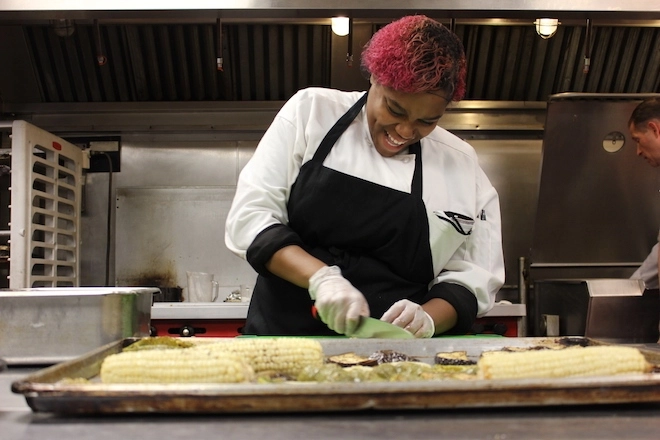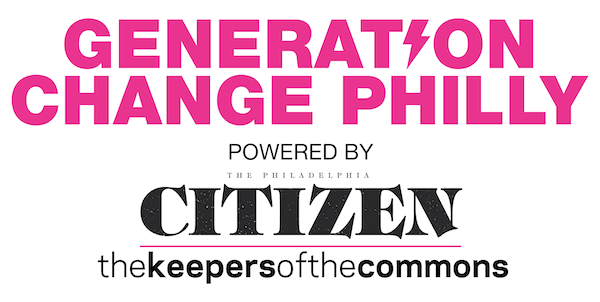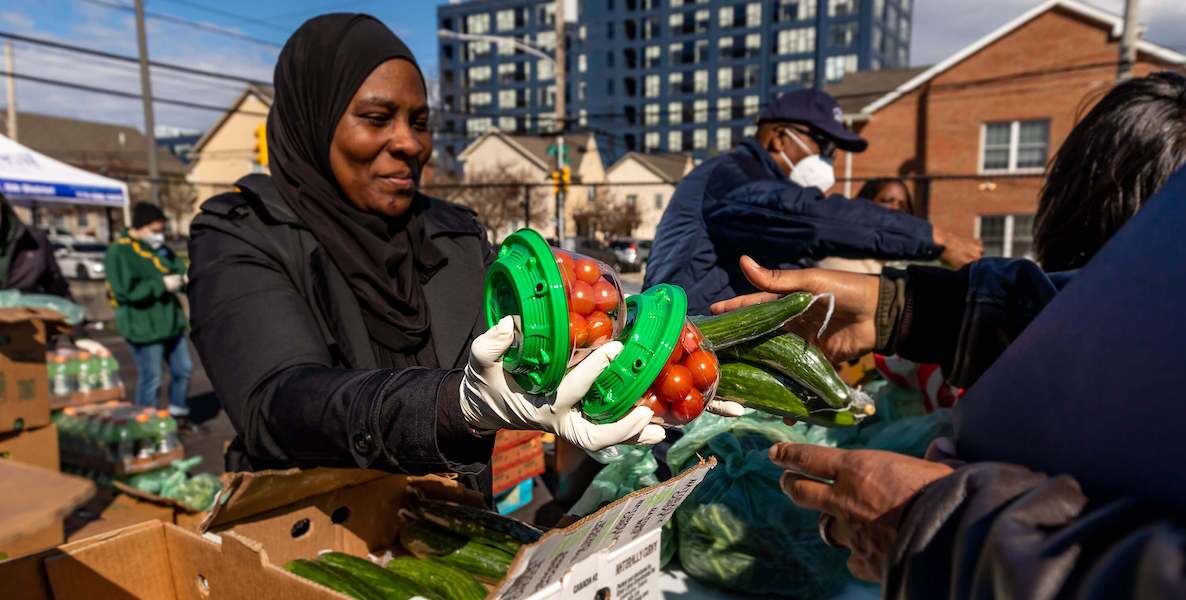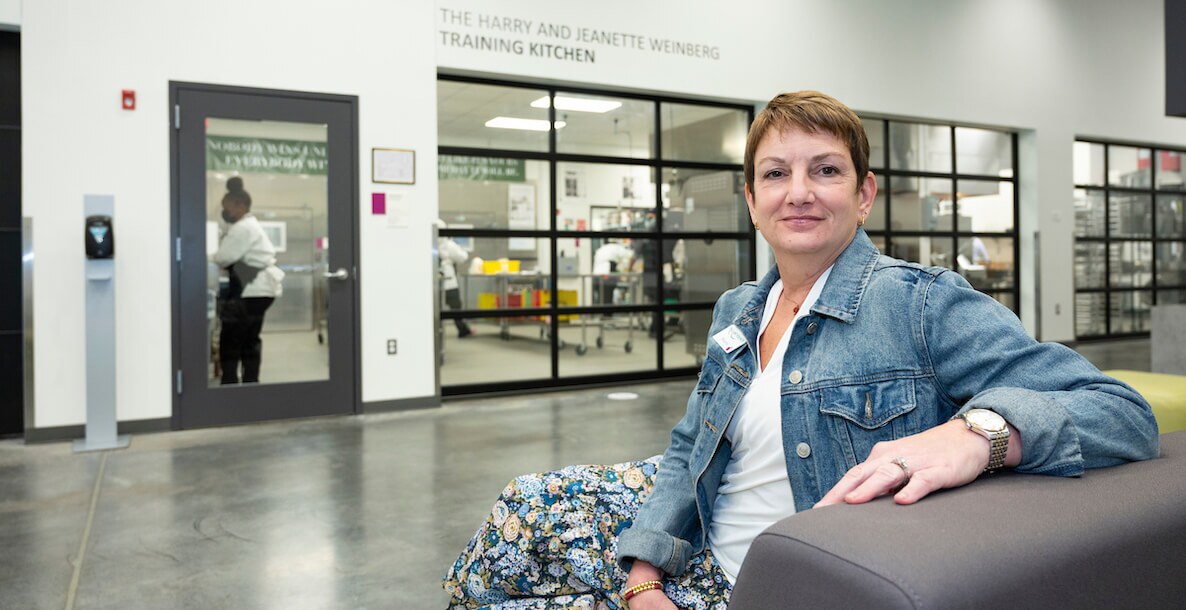In a corner of North Philadelphia, at 10th and Dauphin streets, a sparkling new warehouse is filled with the sounds and smells of a cooking school, a la the kind you’ve seen on TV. Students bustle around in starched white coats, practicing knife skills and studying for food safety certification tests. Instructors balance encouragement and severity, giving students both the confidence they’ll need to persist in the program and the tough love that will ready them for the demanding work environment of a professional kitchen.
It could be the famed Culinary Institute of America, or the Restaurant School at Walnut Hill College in West Philly. But it is Philabundance Community Kitchen (PCK), a culinary training program with a mission far beyond the kitchen: “to promote the self-sufficiency of able-bodied, low-income adults through training and placement in a commercial kitchen setting.”
You may have heard about this crown jewel of the biggest food bank in our region, but you might not know the person who conceived it: Melanie Cataldi, now Chief Impact Officer at Philabundance.
“A lot of times when we talk about ending hunger for good people say, ‘But you’re not really going to end hunger for good,’” says Melanie Cataldi. “It’s about chang[ing] the conversation [to] build scalable models. That’s how movements start.”
Cataldi, who has worked for the organization for 20 years, has long understood that, for hunger relief to truly be effective, it cannot be simply about providing more and more food. Rather, the root cause of poverty, and its attendant contributors—structural inequities, racism, and wealth disparity—need to be systematically addressed.
Her work to leverage Philabundance’s considerable brand recognition, reach, and support to grow the organization beyond its core mission of feeding people in order to address these structural issues have helped Philabundance and Melanie Cataldi garner a national reputation for innovation in food banking. It’s also the work that earns her a spot among our Generation Change Philly, our ongoing project with Keepers of the Commons to highlight the people shaking up the status quo to push our city forward.
RELATED: How you can help fight food insecurity in Philadelphia
She first thought about these issues after an early-thirties career shift led her to Drexel’s nutrition program and then onto Temple University’s College of Public Health. “Everything I did was focused on food: food security, food safety,” she says.
PCK is Cataldi’s masters thesis come to life. Since being hired in 2000 and starting out of a vacant bare bones kitchen, the program has expanded to a shiny new 18,000 square foot commercial kitchen facility with the capacity to train five cohorts of 30-35 trainees per year.
And it’s crucial to Philabundance’s mission. “We made Ending Hunger for Good the north star,” says Melanie Cataldi. Which meant workforce and economic development, education, healthcare and social services all need to work together with food security initiatives. “We pretty quickly determined that we know hunger doesn’t happen in a silo.”
Scholars and activists have criticized traditional food banking on multiple fronts: The food industry itself is a beneficiary of the food banking system—the industry benefits from tax incentives and reduced disposal fees by donating food that may not be fit for sale, all while publicly patting itself on the back for its largesse. Plus, distributing donated ultra-processed food can perpetuate health inequities. And if food is a human right, don’t our most vulnerable neighbors deserve the healthiest, most culturally relevant food, and not the discards of those with means?
RELATED: Learn more about our Generation Change Philly series
But perhaps the most troubling aspect of food banking is that food insecurity and hunger seem to be a bottomless pit of need that can never be filled; how much do we need to feed everyone equitably and when will it be enough? Will it ever be enough?
Those are the questions Melanie Cataldi has spent the last 20-plus years working on—and making huge progress here in Philly. “A lot of times when we talk about ending hunger for good people say, ‘But you’re not really going to end hunger for good,’” says Cataldi. “It’s about chang[ing] the conversation [to] build scalable models. That’s how movements start.”
Serendipitous timing
Cataldi grew up in Vancouver, Washington, and came to Philadelphia when she was 21, “for a boy.” She fell in love. Not with the guy—that fizzled—but with Philadelphia. “It’s the opposite of what I grew up with,” she says. “I love the architecture and the diversity and the grittiness—there’s just nothing I didn’t like about it.”
Cataldi worked office jobs around town before joining a life insurance company as an executive assistant and working her way up to associate. “I was in life insurance into my early thirties,” she says. “I made what I considered to be a great income but didn’t have passion for it.” An avid runner, Cataldi looked for Philadelphia college programs focused on health and found her way to Drexel’s nutrition program. “I loved everything about it.”
RELATED: One woman’s quest to prepare our city’s youth for lives beyond poverty
Melanie Cataldi finished her undergraduate nutrition degree but didn’t want to become a clinical dietitian, the next professional step for many of her classmates. She chose the public health path and enrolled in Temple’s college of public health masters program. Right around the time she was presenting her thesis Philabundance won a small grant, $25,000, for community kitchen work.
Cataldi’s thesis was a feasibility model and public health rationale for a food service job training program designed to address the social determinants of health disparities not simply by feeding more people, but by helping to alleviate poverty by providing job training and placement with family-supporting wages. “It was serendipitous timing I think,” says Melanie Cataldi. “They hired me. We pieced together a program [based on some of the ideas in the thesis] and had 8 graduates in our first class. From there we were able to fundraise and add capacity over time.”
“When you first walk in you think you’re just gonna cook. What really surprised me was they have a course focused on your mental state. Are you able to take the heat and get to the next level of life?” says Rippy.
Raven Rippy, a 22-year-old retail jewelry worker left vulnerable to the closures the pandemic brought to brick-and-mortar shopping, enrolled in PCK in the summer 2021 cohort. Rippy’s mother, who works in senior care and was familiar with Philabundance programming, suggested she look into PCK. Rippy recounts, “I was always into cooking but nobody gave me a chance. Instead of being mad at the job market I chose to pick up a skill.”
While she is appreciative of the culinary skills she gained, for Rippy, the value of the program was about maturing as a professional. “When you first walk in you think you’re just gonna cook. What really surprised me was they have a course focused on your mental state. Are you able to take the heat and get to the next level of life?” she says. “[Instructor Jason Starling] changed my outlook on myself. PCK is a family. It’s not like you’re walking in and just going to school. There’s a support team behind you.” That support team opened the door to a job at Temple University Hospital where Rippy works as a food service attendant, earning $10,000 more annually than she did pre-pandemic.
“The Philabundance Community Kitchen’s focus is making sure that the students have not only the culinary skills but also the life skills that are needed to be self-sufficient,” said Loree D. Jones, CEO of Philabundance.

Trainees graduate into jobs in restaurants, caterers, healthcare and educational food service, shelter kitchens, or into jobs preparing meals at PCK. Average wages are $15 per hour. Impact is tracked via multiple metrics including program graduation rate, employment, retention and wages at placement, and years out, decreased use of public assistance and other factors.
And PCK has multiple functions in addition to culinary job training and placement: a large pre-COVID (and hopefully post-COVID) event space; a demonstration kitchen for nutrition education; a social enterprise providing off-premise catering to meetings and events around the city; a value added processing program where PCK entrepreneurs or community members can move their product ideas from brainstorm through commercialization to become a packaged food on the supermarket shelf; and a contract meal prep function where advanced students prepare thousands of trays of prepared meals served at shelters, soup kitchens, schools, and other agencies.
And with the recent expansion comes a very real impact PCK can have in producing food for the community. “We will be able to grow to millions of meals a year,” Cataldi says. “In just the past few weeks, we’ve gone from 8000 meals per week to producing meals for Afghan refugees, which will add another several thousand per day.”
Institutional memory and an engine for innovation
In a sector known for job-hopping around and burn out, Melanie Cataldi is practically a lifer, starting in a program coordinator role to try to put her thesis into action—and now collaborating with the board and her C-Suite colleagues to determine the strategy of the organization. Her decades of experience give her a quiet confidence. She is both institutional memory and engine for new partnerships and initiatives.
“Change is hard. Pushing boundaries is exhausting,” says Jones. “Melanie has been able to manage both while conceiving and leading a program that has had success for over 20 years. By being comfortable and willing to learn, pivot, and push, Melanie has kept PCK relevant and allowed it to meet the moment and the needs of the students and communities we serve.”
“I think hunger—like racial inequity—is hard to talk about when it’s in your backyard. And I think one of the gifts of this pandemic is it has brought this front and center,” says Cataldi. “It doesn’t matter how much money you make or where you live, you can’t ignore this inequity. So let’s have the conversation.”
Parallel to the growth of PCK, Cataldi took on broader responsibility at Philabundance, rising from program coordinator, to manager, director, vice president, senior vice president and then chief operating officer, overseeing all of the operations and facilities, before moving to her current position as chief impact officer. In that role she oversees the Ending Hunger for Good Department which encompasses the Philabundance Community Kitchen, and Cross-Sector Initiatives which include partnerships with healthcare, education, housing, workforce development, and financial literacy programs. She also oversees Impact and Evaluation, the data shop of Philabundance.
Through that growth, Melanie Cataldi’s focus has been on building efficient systems. “You need to know how to get barriers out of the way for people. I didn’t know how to manage a fleet [of trucks]. But I know how to manage somebody who can manage a fleet.”
RELATED: How Jen Devor is working to build the best citizens of her city
The resilience of those systems was tested suddenly by the pandemic in March 2020, which saw the organization grow from a pre-pandemic budget of about $15 million in cash and $50 million if you include food, Cataldi says, to more than double that “We really changed the model to distribute as much as we could. And what I think we’ll do is keep what worked. Because the hunger pandemic and the unemployment is not going away anytime soon.”
Cataldi reflects, “I think hunger—like racial inequity—is hard to talk about when it’s in your backyard. And I think one of the gifts of this pandemic is it has brought this front and center. It doesn’t matter how much money you make or where you live, you can’t ignore this inequity. So let’s have the conversation.”
Editor’s note: Since this story ran, Cataldi left her position at Philabundance to become a community impact strategist.





